
Sidonie-Gabrielle Colette, known mononymously as Colette, was a French author and woman of letters. She was also a mime, actress, and journalist. Colette is best known in the English-speaking world for her 1944 novella Gigi, which was the basis for the 1958 film and the 1973 stage production of the same name. Her short story collection The Tendrils of the Vine is also famous in France.

Roberto Gastone Zeffiro Rossellini was an Italian film director, screenwriter and producer. He was one of the most prominent directors of the Italian neorealist cinema, contributing to the movement with films such as Rome, Open City (1945), Paisan (1946), and Germany, Year Zero (1948). He is also known for his films starring Ingrid Bergman, Stromboli (1950), Europe '51 (1952), Journey to Italy (1954), Fear (1954) and Joan of Arc at the Stake (1954).

Ingrid Bergman was a Swedish actress. With a career spanning five decades, Bergman is often regarded as one of the most influential screen figures in cinematic history. She won numerous accolades, including three Academy Awards, two Primetime Emmy Awards, a Tony Award, four Golden Globe Awards, BAFTA Award, and a Volpi Cup. She is one of only four actresses to have received at least three acting Academy Awards. In 1999, the American Film Institute recognised Bergman as the fourth greatest female screen legend of Classic Hollywood Cinema.

Italian neorealism, also known as the Golden Age, was a national film movement characterized by stories set amongst the poor and the working class. They are filmed on location, frequently with non-professional actors. They primarily address the difficult economic and moral conditions of post-World War II Italy, representing changes in the Italian psyche and conditions of everyday life, including poverty, oppression, injustice and desperation.

Isabella Fiorella Elettra Giovanna Rossellini is an Italian-American actress and model. The daughter of Swedish actress Ingrid Bergman and Italian film director Roberto Rossellini, she is noted for her successful tenure as a Lancôme model and an established career in American cinema.
Antoine and Colette is a 1962 French short film written and directed by François Truffaut. It is the second installment in Truffaut's five-film series about Antoine Doinel, the character he follows from boyhood to adulthood. Antoine and Colette was made for the 1962 anthology collection Love at Twenty, which also featured shorts from the renowned directors Shintarô Ishihara, Marcel Ophüls, Renzo Rossellini and Andrzej Wajda.
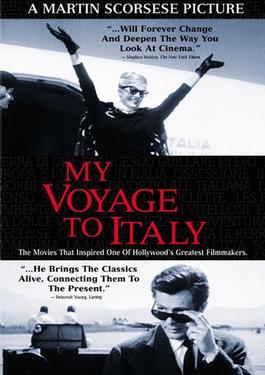
My Voyage to Italy is a personal documentary by acclaimed Italian-American director Martin Scorsese. The film is a voyage through Italian cinema history, marking influential films for Scorsese and particularly covering the Italian neorealism period.
Friedel Pia Lindström is a Swedish television journalist, and the first child of actress Ingrid Bergman.
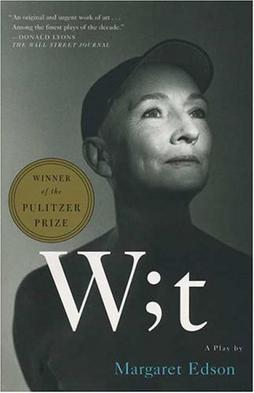
Wit is a one-act play written by American playwright Margaret Edson, which won the 1999 Pulitzer Prize for Drama. Edson used her work experience in a hospital as part of the inspiration for her play.

Claudine at School is a 1900 novel by the French writer Colette. The narrative recounts the final year of secondary school of 15-year-old Claudine, her brazen confrontations with her headmistress, Mlle Sergent, and her fellow students. It was Colette's first published novel, originally attributed to her first husband, the writer Willy. The work is assumed to be highly autobiographical and includes lyrical descriptions of the Burgundian countryside, where Colette grew up.

The Flowers of St. Francis is a 1950 film directed by Roberto Rossellini and co-written by Federico Fellini. The film is based on two books, the 14th-century novel Fioretti di San Francesco and La Vita di Frate Ginepro, both of which relate the life and work of St. Francis and the early Franciscans. I Fioretti is composed of 78 small chapters. The novel as a whole is less biographical and instead focuses on relating tales of the life of St. Francis and his followers. The movie follows the same premise, though rather than relating all 78 chapters, it focuses instead on nine of them. Each chapter is composed in the style of a parable and, like parables, contains a moral theme. Every new scene transitions with a chapter marker, a device that directly relates the film to the novel. On October 6, 1952, when the movie debuted in America, where the novel was much less known, the chapter markers were removed.
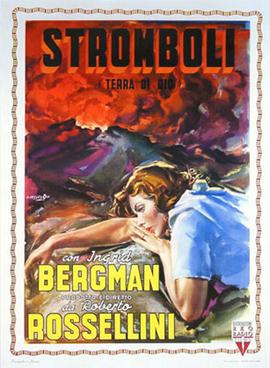
Stromboli, also known as Stromboli, Land of God, is a 1950 Italian-American film directed by Roberto Rossellini and starring Ingrid Bergman. The drama is considered a classic example of Italian neorealism.
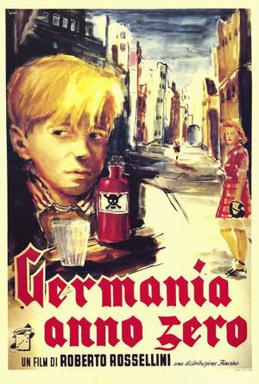
Germany, Year Zero is a 1948 film directed by Roberto Rossellini, and is the final film in Rossellini's unofficial war film trilogy, following Rome, Open City and Paisà. Germany Year Zero takes place in Allied-occupied Germany, unlike the others, which take place in German-occupied Rome and during the Allied invasion of Italy, respectively.
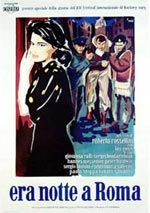
Escape by Night, also titled Blackout in Rome, is a 1960 Italian–French war drama film directed by Roberto Rossellini.
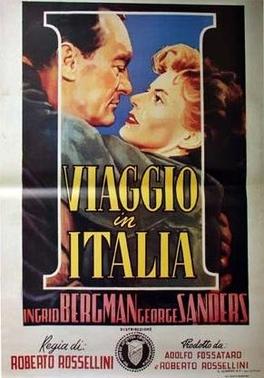
Journey to Italy, also known as Voyage to Italy, is a 1954 drama film directed by Roberto Rossellini. Ingrid Bergman and George Sanders play Katherine and Alex Joyce, a childless English married couple on a trip to Italy whose marriage is on the point of collapse until they are miraculously reconciled. The film was written by Rossellini and Vitaliano Brancati, but is loosely based on the 1934 novel Duo by Colette. Although the film was an Italian production, its dialogue was in English. The first theatrical release was in Italy under the title Viaggio in Italia; the dialogue had been dubbed into Italian.
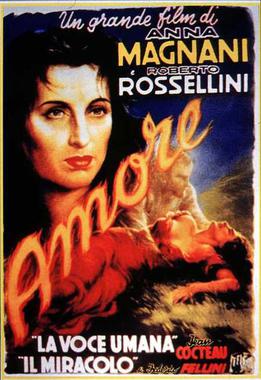
L'Amore ('Love') is a 1948 Italian drama anthology film directed by Roberto Rossellini starring Anna Magnani and Federico Fellini. It consists of two parts, The Human Voice, based on Jean Cocteau's 1929 play of the same title, and The Miracle, based on Ramón del Valle-Inclán's 1904 novel Flor de santidad. The second part was banned in the United States until it was cleared in 1952 by the Supreme Court's decision upholding the right to freedom of speech.
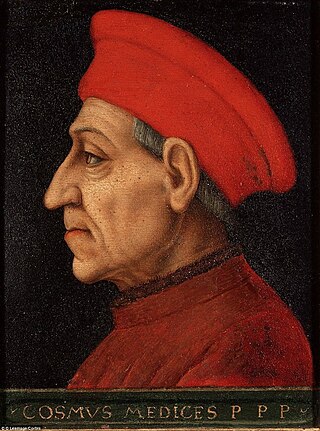
The Age of the Medici, originally released in Italy as L'età di Cosimo de Medici, is a 1973 3-part TV series about the Renaissance in Florence, directed by Roberto Rossellini. The series was shot in English in the hope of securing a North American release, which it failed to achieve, and was later dubbed into Italian and shown on state television. The three television films are: Cosimo de Medici, The Power of Cosimo and Leon Battista Alberti: Humanism. It is Fred Ward's debut role.

Love at Twenty is a 1962 French-produced omnibus project of Pierre Roustang, consisting of five segments, each with a different director from a different country. It was entered into the 12th Berlin International Film Festival.
The Pure and the Impure is a 1932 novel by the French writer Colette. It consists of a series of conversations about sex, gender and attraction. Colette considered it her best book, and described it as "the nearest I shall ever come to writing an autobiography".
Margaret McQueen Crosland was an English literary biographer and translator. She also used the pen name Leonard de Saint-Yves.
















